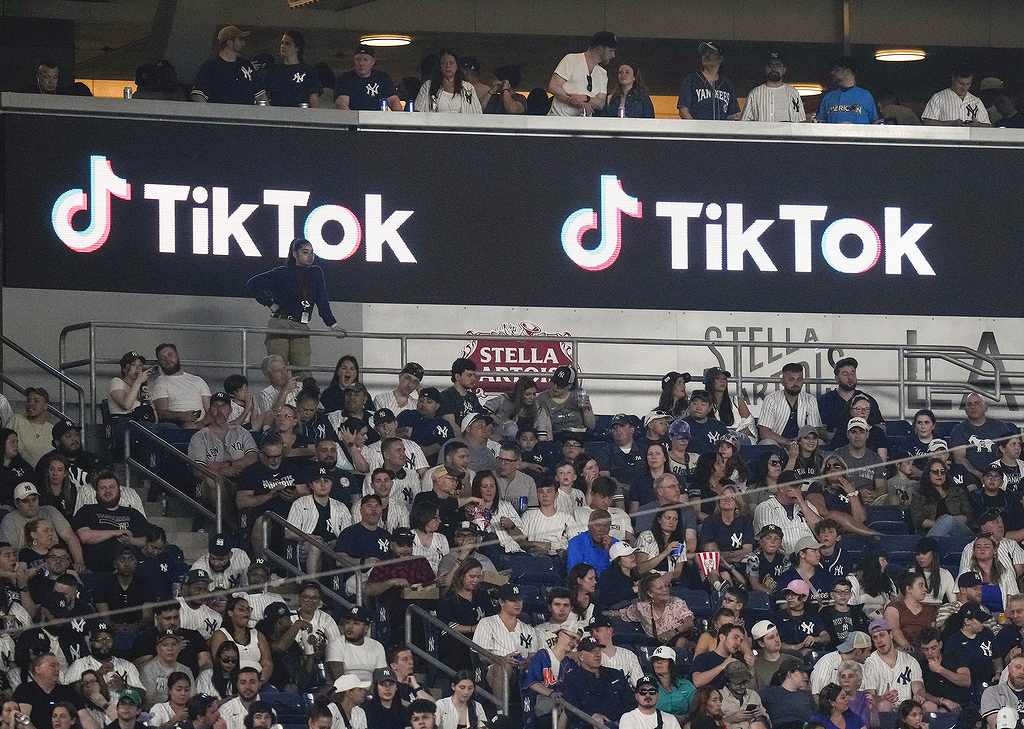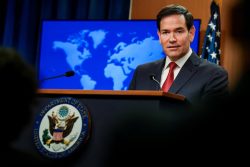
Fans sit under a TikTok ad at a baseball game at Yankee Stadium on April 14 in New York.
14:53 JST, March 9, 2024
WASHINGTON (AP) — President Joe Biden on Friday endorsed legislation that could lead to the popular video-sharing app TikTok being banned in the United States, a move that comes amid growing concern in Washington about keeping Americans’ data out of China’s hands.
The legislation that passed through the U.S. House Energy and Commerce Committee unanimously on Thursday calls on China’s ByteDance to divest its ownership of TikTok — or effectively face a U.S. ban. Republican House Speaker Mike Johnson also supports the bill and has indicated it would soon come up for a full vote in the House.
“If they pass it, I’ll sign it,” Biden said when asked by reporters about the legislation.
The White House had provided technical support in the drafting of the bill, though White House press secretary Karine Jean-Pierre said earlier this week the TikTok legislation “still needs some work” to get to a place where Biden would endorse it.
Former President Donald Trump, the likely Republican nominee, came out in a Truth Social post on Thursday saying he opposed a ban because it would help rival social media platform Facebook. Trump’s opposition to the legislation comes after he issued — and then rescinded — an executive action late in his presidency intended to ban TikTok and another popular app, WeChat.
Trump’s pushback puts him on the opposite side of the debate of powerful Republicans, including Johnson and Republican House Majority Leader Steve Scalise, who has called the legislation a “critical national security bill.”
Both the FBI and the Federal Communications Commission have warned that TikTok owner ByteDance could share user data — such as browsing history, location and biometric identifiers — with China’s authoritarian government. TikTok said it has never done that and wouldn’t do so if asked. The U.S. government also hasn’t provided evidence of that happening.
In a separate move, Biden recently signed an executive order allowing the Department of Justice and other federal agencies to take steps to prevent the large-scale transfer of Americans’ personal data to what the White House calls “countries of concern,” including China, Russia, North Korea, Iran, Cuba and Venezuela.
Biden, in 2022, banned the use of TikTok by the federal government’s nearly 4 million employees on devices owned by its agencies, with limited exceptions for law enforcement, national security and security research purposes.
While his administration has raised national security concerns about TikTok, Biden’s reelection campaign last month joined the platform.
If enacted, the bill would effectively ban TikTok and other ByteDance apps from being available in Apple or Google app stores or on web hosting services in the U.S.
The bill takes a two-pronged approach. First, it requires ByteDance Ltd., which is based in Beijing, to divest TikTok and other applications it controls within 180 days of enactment of the bill or those applications will be prohibited in the United States. Second, it creates a narrow process to let the executive branch prohibit access to an app owned by a foreign adversary if it poses a threat to national security.
The company also has promised to wall off U.S. user data from its parent company through a separate entity run independently from ByteDance and monitored by outside observers.
A poll published last month by The Associated Press and NORC Center for Public Affairs Research found Americans are deeply divided on the issue of banning the app. Thirty-one percent of U.S. adults said they would favor a nationwide ban on TikTok use, while 35% said they would oppose that type of action. An additional 31% of adults said they neither favor nor oppose a ban on the social media platform,
The AP-NORC poll shows TikTok users — about 170 million in the U.S., most of whom skew younger — are less likely to be worried about the app sharing American users’ data, reflecting a previously felt generational divide. About a quarter of daily users say they are “extremely or very concerned” about the idea of the Chinese government obtaining the personal information of users, compared to about half of U.S. adults overall.
"News Services" POPULAR ARTICLE
-

American Playwright Jeremy O. Harris Arrested in Japan on Alleged Drug Smuggling
-

Japan’s Nikkei Stock Average as JGB Yields, Yen Rise on Rate-Hike Bets
-

Japan’s Nikkei Stock Average Licks Wounds after Selloff Sparked by BOJ Hike Bets (UPDATE 1)
-

Japan’s Nikkei Stock Average Buoyed by Stable Yen; SoftBank’s Slide Caps Gains (UPDATE 1)
-

Japanese Bond Yields Zoom, Stocks Slide as Rate Hike Looms
JN ACCESS RANKING
-

Keidanren Chairman Yoshinobu Tsutsui Visits Kashiwazaki-Kariwa Nuclear Power Plant; Inspects New Emergency Safety System
-

Imports of Rare Earths from China Facing Delays, May Be Caused by Deterioration of Japan-China Relations
-

University of Tokyo Professor Discusses Japanese Economic Security in Interview Ahead of Forum
-

Tokyo Economic Security Forum to Hold Inaugural Meeting Amid Tense Global Environment
-

Japan Pulls out of Vietnam Nuclear Project, Complicating Hanoi’s Power Plans


























